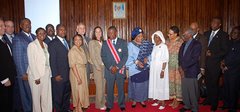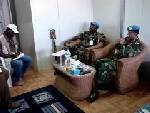



1. Who is Charles Taylor?
From 1989 to 1997, Charles Taylor led the National Patriotic Front of Liberia (NPFL), a rebel group that sought to unseat Liberia's then-president, Samuel K. Doe, and later to take over control of the country. Taylor gained international notoriety for the brutal abuses of civilians perpetrated by his NPFL forces in Liberia, and for use of child soldiers organized by the NPFL into "Small Boy Units." On July 19, 1997, the conflict ended when Charles Taylor was elected president of Liberia in an election in which there was an implicit threat that Taylor would resume fighting if he lost.
Charles Taylor's presidency, which lasted from 1997 to 2003, was characterized by intolerance of dissent and harassment of the press, civil society and political opposition. Meanwhile, these and other human rights abuses were accompanied by near-total impunity. Ultimately, this repression fueled the formation of two rebel groups and, in 1999, a return to armed conflict in Liberia. Following rebel incursions into the Liberian capital Monrovia, Taylor was forced from office in August 2003.
Forces under Taylor's command have also been implicated in supporting and participating in armed conflicts, cross-border raids and human rights abuses in neighboring countries, including Sierra Leone, Guinea and Côte d'Ivoire. Taylor has been charged with responsibility for serious international crimes and is now facing trial, in part because forces allegedly under his command have been implicated in supporting and participating in human rights abuses in Sierra Leone.
2. What is the Special Court for Sierra Leone, the court that is trying Charles Taylor?
The Special Court for Sierra Leone is an ad hoc international-national court, referred to as a "hybrid" or "mixed" international tribunal. The court was established in 2002 through an agreement between the United Nations and the Sierra Leonean government.
As a "hybrid" model of international tribunal, the Special Court has features that differ from those found in other international tribunals like the International Criminal Tribunals for the former Yugoslavia and Rwanda. These include a bench composed of Sierra Leonean and international judges and staff, and authority over domestic as well as international crimes. The court, based in the Sierra Leonean capital of Freetown, is located in the country where the crimes were committed.
The court's mandate is to "prosecute persons who bear the greatest responsibility for serious violations of international humanitarian law" committed in Sierra Leone and also violations of Sierra Leonean law committed in the country. Although Sierra Leone's conflict lasted from 1991 to 2002, the court can only hear cases of crimes committed since 1996. The crimes under the court's mandate include crimes against humanity, war crimes, and other serious violations of international humanitarian law, such as recruitment of child soldiers.
Aside from Taylor, the Special Court is currently trying eight individuals in three separate trials. The accused are associated with three warring factions during Sierra Leone's conflict: the Revolutionary United Front (RUF), the Armed Forces Revolutionary Council (AFRC), and the Civil Defence Forces (CDF). In the trials of the accused associated with the CDF and AFRC, which began in June 2004 and March 2005 respectively, the presentation of the cases is complete and the judges are expected to issue verdicts in the next couple of months. In the trial of the accused associated with the RUF, which began in July 2004, the defense began presentation of its case in May 2007.
3. What is Taylor charged with?
Taylor is charged by the Special Court for Sierra Leone with 11 counts of war crimes, crimes against humanity and other serious violations of international humanitarian law committed in Sierra Leone. The alleged crimes cover murdering and mutilating civilians, including cutting off their limbs, using women and girls as sex slaves, abducting adults and children, and forcing them to perform forced labor or become fighters during Sierra Leone's conflict.
Taylor is charged on the basis of his alleged role as a major backer of the Sierra Leone rebel group the Revolutionary United Front (RUF), his links with senior leaders in the RUF and a second warring faction, the Armed Forces Revolutionary Council, and responsibility for Liberian forces fighting in support of the Sierra Leonean rebels.
The specific counts against Taylor are:- Five counts of war crimes: terrorizing civilians, murder, outrages on personal dignity, cruel treatment, and looting;
- Five counts of crimes against humanity: murder, rape, sexual slavery, mutilating and beating, and enslavement; and
- One count of other serious violations of international humanitarian law: recruiting and using child soldiers.Taylor is being charged with individual criminal responsibility for the crimes on several legal bases. First, Taylor allegedly participated in the commission of the crimes by planning, instigating, and ordering them; aiding and abetting them by providing military training and support to the RUF and AFRC; and participating in the execution of a plan to take control of Sierra Leone during which the crimes were committed. Second, he allegedly was a superior to perpetrators of the crimes and failed to take reasonable measures to prevent or punish the crimes while knowing or having reason to know about them.
Taylor was initially charged with 17 counts, but the indictment was amended in March 2006 to 11 counts.Taylor is the first president of an African state to be indicted on serious crimes under international law by an internationalized criminal court.
4. How did Taylor come into the custody of the Special Court and where will his trial take place?
In June 2003, the Special Court made public an indictment against Taylor while he was attending peace talks in Ghana related to armed conflict in Liberia. Taylor immediately returned to Liberia, but following rebel incursions in the Liberian capital Monrovia, Taylor agreed to step down as president. He then went to Nigeria in August 2003, where he was offered safe haven by Nigerian President Olusegun Obasanjo.
Taylor remained in Calabar, Nigeria, for nearly three years, during which Nigeria's president rejected calls to surrender Taylor for trial. However, in March 2006, Liberia's newly elected president, Ellen Johnson-Sirleaf, requested Obasanjo to surrender Taylor, and Obasanjo agreed. Obasanjo did not arrest Taylor, though, and he disappeared almost immediately. Nevertheless, on March 29, 2006, Taylor was apprehended by Nigerian police near Nigeria's border with Cameroon. He was then transported to Liberia, where he was taken into UN custody and transferred to the Special Court in Freetown.
Although the Special Court for Sierra Leone is based in Freetown, Sierra Leone, Taylor's trial will take place in The Hague at the International Criminal Court (ICC), which is lending its facilities to the Special Court for Sierra Leone. (See question 6 for explanation of why Taylor's trial was relocated).
5. When will Taylor's trial begin and how long will it last?
The start date for Taylor's trial was initially set for April 2, 2007, but was rescheduled to begin on June 4, 2007 to give the defense more time to prepare.
On June 4, the prosecutor will provide an opening statement after which the trial will be adjourned until June 25. The judges granted this additional postponement in order to allow the defense counsel several weeks more to prepare on the basis that the defense had lost this amount of preparation time due to suspended consultations between counsel and Taylor between March 5 and 22. Defense counsel suspended these consultations, which should be confidential, as video surveillance was being conducted in the space where the meetings took place.
Trials for serious crimes under international law, and especially of leaders, can be time-intensive. The cases are complex, and ensuring the accused receives the full range of fair trial protections in accordance with international standards can take time. Human Rights Watch believes it is crucial for the court to ensure that Taylor's trial is scrupulously fair. An unfair trial would lack legitimacy and credibility, while fair proceedings will help ensure that the trial plays its role in building respect for the rule of law in West Africa.
The Special Court's prosecutor, Stephen Rapp, has estimated that Taylor's trial will last between 12 and 18 months.
6. Why is Taylor's trial taking place in The Hague?
Taylor's trial was relocated to The Hague on the basis of a request by the Special Court's president immediately following Taylor's surrender in March 2006. The request to the Dutch government cited concerns over stability in West Africa if the trial was held in Sierra Leone. The Netherlands agreed to the relocation on several conditions, including that another country would offer facilities to incarcerate Taylor in the event he is convicted.Despite initial delays and reluctance for any country to volunteer, on June 15, 2006, the United Kingdom announced an offer to incarcerate Taylor if he is convicted. The UN Security Council then passed a resolution to provide a legal basis for the relocation, another of the conditions set by the Netherlands.
7. Does the fact that Taylor's trial is taking place in The Hague pose special challenges?
The relocation of Taylor's trial to The Hague creates new challenges in ensuring that people in West Africa will know about developments in the proceedings. But the Special Court is planning important actions to ensure the proceedings are accessible to West Africans, including:- Facilitating attendance of journalists and civil society representatives from Liberia and Sierra Leone on a rotating basis at proceedings in The Hague;
- Preparing video and audio summaries of Taylor's trial for dissemination throughout Sierra Leone; and Making broadcasts of Taylor's trial available at the court's premises in Freetown.
Human Rights Watch believes it is critically important that the Special Court's work be accessible to the communities most affected by the crimes. The Special Court has consistently implemented robust outreach and communications programming to inform people in Sierra Leone about the court.
8. How has Human Rights Watch been involved in ensuring justice in Sierra Leone?
Since 1998, Human Rights Watch researchers have extensively documented serious human rights violations committed by all warring factions, and pressed for the perpetrators of the crimes to be held accountable. Human Rights Watch maintained a field office in Freetown, Sierra Leone, from 1999 to 2002. From 1998-2007, Human Rights Watch released a series of reports detailing abuses to raise public awareness about them.Human Rights Watch pressed for justice to be done and the creation of the Special Court. Since the court's establishment, Human Rights Watch has assessed the work of the court through on-site visits and interviews with court staff, defense counsel, and Sierra Leonean civil society. Human Rights Watch has issued two reports on the court's work that detail the court's accomplishments to bringing justice for crimes in Sierra Leone. The reports also made recommendations to improve court operations, for example, in terms of in the areas of witness protection and resources for the defense.
Human Rights Watch has consistently pressed for the Special Court to receive sufficient funding. The court is not funded by contributions from UN member states and has been forced to rely on voluntary contributions, although it has received some grants from the United Nations. The court's funding remains uncertain and inadequate.
While Taylor was in Nigeria, Human Rights Watch actively pressed for his surrender to face trial. Human Rights Watch worked with a coalition of international and West African civil society groups toward this end. Human Rights Watch will attend the opening of Taylor's trial in The Hague and assess the proceedings throughout their duration.







